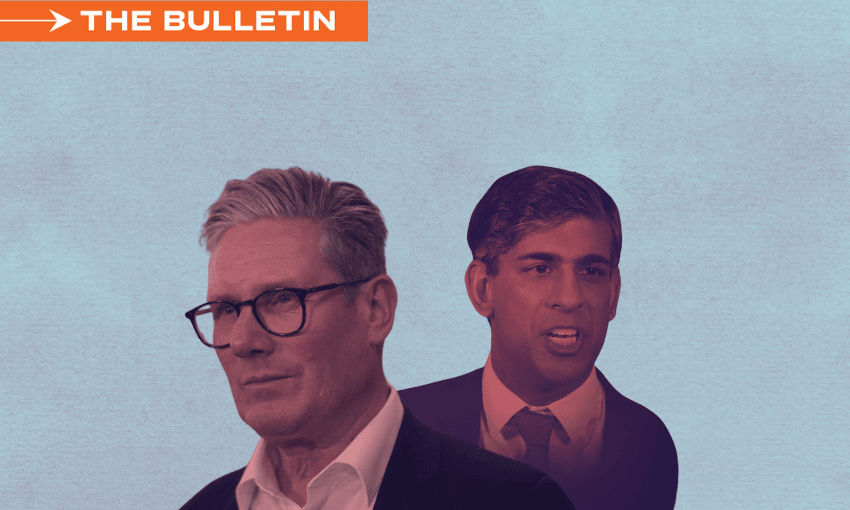It’s been a while since Labour winning was a genuine possibility, let alone a likelihood, writes Stewart Sowman-Lund in this extract from The Bulletin. To receive The Bulletin in full each weekday, sign up here.
The final hours of campaigning
It’s election day in the UK, or it will be in a few hours anyway. By this time tomorrow, polls will be about to close and we’ll learn the initial results shortly after. It’s not expected to be a hugely surprising election result, with many pundits and polls predicting something close to a Labour landslide. Nevertheless, any election in the UK is an important one and a change of government after 14 years would be significant. A Google search of “what would Labour mean for the UK” brings up dozens of articles covering everything from the significance of a change in government for the economy, for the EU, for investors, for beneficiaries – and beyond. It’s been a while since Labour winning was a genuine possibility, let alone a likelihood.
The lessons for New Zealand
I’ll leave a deeper analysis of the election itself to The World Bulletin, and I recommend the latest episode of The News Agents podcast for a whirlwind trip through a busy few days in UK politics, but it’s worth pondering what all of this could mean for New Zealand. The last time Labour was in power in the UK was under Gordon Brown in 2010. The world was a very different place, though there were some parallels – it was the tail end of the global financial crisis and Brown’s government was charged with keeping the economy stable.
Back in May, when the election date was announced, UK-based New Zealand journalist Henry Cooke took a look at what New Zealand MPs will be keeping an eye on this week as the UK heads to the polls (Cooke will be joining The Spinoff’s editor-at-large Toby Manhire to breakdown the election result next week). One element, he argued, is whether inflation coming down can result in a boost for the governing party. Our government will be hoping that if the economy improves throughout 2025, it can ride a wave of positive fiscal winds into the election the following year, an argument made by the NZ Initiative’s Oliver Hartwich in March. In a Herald column this week looking at lessons for New Zealand from the UK election, former Labour minister and Act leader Richard Prebble similarly argued that losing control of inflation is a quick way for voter trust to decline.
The UK-NZ relationship
At his post-cabinet press conference on Monday, Christopher Luxon was asked whether he’d be prepared for a possible Trump presidency in the United States. He gave the typically diplomatic answer that he’d be able to work with whomever was in office, as his job was just to represent Aotearoa. Luxon would have given the same answer if asked about the UK, of course, but a Labour government does not quite so naturally fit with the politics of our current government. Prior to becoming prime minister, Luxon visited the UK on a tour to, as he told Newsroom at the time, “nick and steal” policy ideas. It was on this trip in 2022 that he infamously labelled New Zealand businesses “soft” while speaking at a rightwing thinktank, but he was also due to meet with several high-profile Conservative MPs until Boris Johnson’s resignation as prime minister saw these meetings cancelled.
But regardless of the party governing in the UK, New Zealand’s relationship with the “motherland” remains strong. It was under Labour that New Zealand launched its free-trade deal with the UK, an agreement negotiated first between Jacinda Ardern and Boris Johnson (a leader Ardern once referred to in a tweet as the “gaffe man”, showing politics goes well beyond who is in charge). Luxon affirmed the state of our relationship during a call with UK PM Rishi Sunak back in February, and not long after, when celebrating one year of the free-trade deal, trade minister Todd McClay said the UK was our fastest-growing export market. A change in government isn’t likely to damage this.
The state of the race
To finish, a brief look at the state of the race itself. I noted up the top that there’s seemingly no route to a Conservative victory, and that’s true, but it’s more complex (and interesting) than that. On the latest episode of The Rest is Politics, co-host Rory Stewart observed that, on recent polling, the combined results for the Conservatives and Labour would be a mere 63% – while “historically at the elections in the 50s and 60s, the parties were getting close to 50% of the vote on their own”. It means almost half of voters are heading to smaller parties, a narrative that has parallels to our election last year when Labour and National’s combined result was also around 63%. Meanwhile, as is traditional for a party behind in the polls, a former leader headed onto the campaign trail this week in the form of Boris Johnson – though as The Guardian reported, he didn’t lump praise on Sunak’s premiership.
I’ll leave you with this simply cursed election night graphic from Sky News, shared on Twitter. If there’s one exciting thing about a dull election, it’s tuning into the TV analysis and seeing the creative and sometimes creepy visual effects (remember our own election night Laser Kiwi?)
